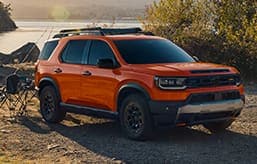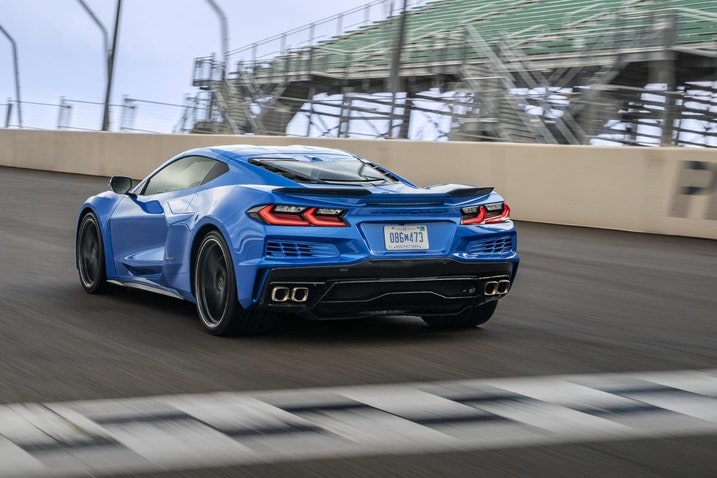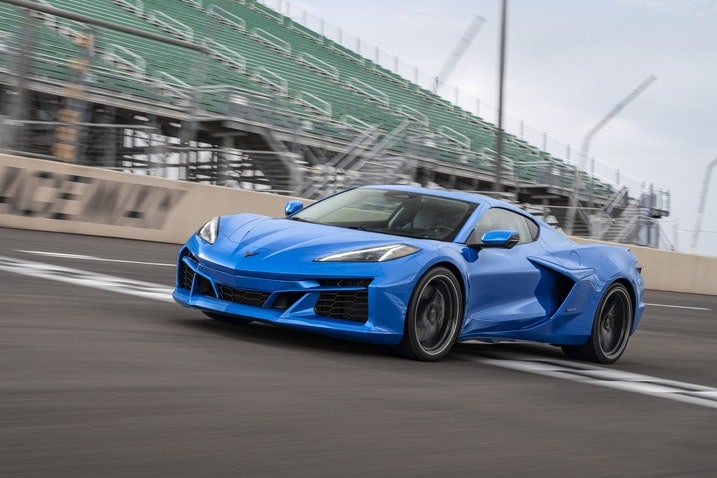- Porsche's new 911 Carrera GTS uses a turbocharged flat-six and hybrid powertrain.
- With 532 horsepower and an estimated 0-to-60-mph time of 2.9 seconds, it'll be one of the quickest 911s available.
- Here's how the 911 hybrid stacks up against the current hybrid sports car king, the Chevy Corvette E-Ray.
Porsche 911 Hybrid vs. Chevy Corvette E-Ray: Hybrid Sports Cars Compared
It'll be neck-and-neck on the drag strip
Powertrain electrification has finally come to one of the best sports cars in the world in the form of the 2025 Porsche 911 Carrera GTS. With 532 horsepower and 449 lb-ft of torque on tap from an electric motor paired to a new turbocharged 3.6-liter flat-six, Porsche says the 2025 911 GTS can rocket from zero to 60 mph in 2.9 seconds. But when it launches at the end of this year, the Porsche 911 hybrid will run smack into an old rival that boasts a high-output electrified engine of its own. Before we get a chance to pilot these heavy hitters in our world-famous U-Drags race, we'll play armchair experts as we compare the 911 hybrid and Chevy Corvette E-Ray on paper.
911 hybrid vs. Corvette hybrid: Pricing
The 2025 Porsche 911 hybrid is offered in four variants. It starts as the rear-drive Carrera GTS coupe, priced from $166,895, including the $1,995 destination fee. Opting for the drop-top Cabriolet increases the price to $180,195. If you want all-wheel drive, the Carrera 4 GTS coupe and Carrera 4 GTS Cabriolet start from $174,695 and $187,995, respectively.
These prices represent a roughly $15,000 price increase compared to last year's non-hybrid GTS, but a few newly standard items help close the gap. Additional Race-Tex (faux-suede) trim, rear-axle steering, matrix-design headlights, lane keeping assistance, ambient lighting and power-folding mirrors were all previously optional extras that are included on every new GTS. As all Porsche buyers know, however, the starting price is truly just the beginning. We expect old favorites like a front-axle lift system, custom paint, adaptive dampers, hardcore sport seats and fancy leather upholstery to be available for an upcharge. In an interesting twist, all 2025 911 coupes will come as two-seaters standard; you can add the rear jump seats back in for no additional cost.
The 2024 Chevy Corvette E-Ray starts at $106,595 — still a considerable sum but a fraction of the 911's price. In its base 1LZ form, it comes with a few features that are optional on the GTS. Even if you spec the top-trim 3LZ and add all sorts of carbon-fiber exterior details and an illuminated engine bay, the E-Ray will retail for less than the 911 hybrid's starting price.
911 hybrid vs. Corvette hybrid: Performance
Porsche says the 911 Carrera GTS hybrid can accelerate from zero to 60 mph in 2.9 seconds, which is an astounding figure. For context, that's slightly quicker than what we managed from the last-generation 911 Turbo S (3.0 seconds) and the current Carrera 4 GTS (also 3.0 seconds). We think it might be even quicker, as we've found that acceleration results at our test track are generally a tenth or two faster than Porsche's published claims.
But the Corvette E-Ray packs a tremendous 670 horsepower, all-wheel traction and a mid-engine layout — all of which allow the E-Ray to blaze to 60 mph in 2.5 seconds, according to Chevrolet (note that Chevy includes 1 foot of rollout in its calculation, and Porsche does not). We haven't been able to verify these claims at our own test track, but during our McLaren 750S vs. Chevy Corvette E-Ray U-Drags race, the Corvette placed a best run of 2.8 seconds to 60 mph (we also don't include rollout in our testing figures). The U-Drags surface is slightly different from our test track's, and we get the feeling that once we test the 911 hybrid and Corvette E-Ray at our facility, we may have to move the decimal point a few places to see which one comes out ahead.
911 hybrid vs. Corvette hybrid: Headroom for tall people
Am I placing my thumb on the scale a bit to even out this specs comparison? Yes, but I'm writing this article, so enjoy.
As much as I loved our long-term Corvette Stingray, my 6-foot-4 frame never really fit without a degree of compromise. I have almost enough headroom to sit comfortably, but because the Corvette coupe is really a targa, the crossbar that makes up the frame of the rear window lies directly above my head when the seat is in its rearmost position. That means the top of my head butts up against this crossbar — definitely not comfortable, and probably not safe. So I have to scoot the seat forward, which results in my increasingly creaky knees angling up into a slightly uncomfortable position.
Space isn't an issue at all in the Porsche 911. I can set my seat to the ideal driving position and — provided the coupe doesn't have a sunroof — I even have a couple inches of headroom to spare. More so than its competitors, the 911 is the ideal sports car for a tall guy. Such is my love for the Corvette that I can put my issues aside to just make it work, but I feel truly at ease in the 911.
911 hybrid vs. Corvette hybrid: But what about ...
There's one svelte elephant in the room: the upcoming Chevy Corvette ZR1. Set for an official unveil this summer, the ZR1 is expected to marry the 5.5-liter flat-plane crank V8 from the track-attack Corvette Z06 with the E-Ray's hybrid system. The exotic powertrain plus all the behind-the-scenes hardware that Chevy will surely add will likely pull the Corvette ZR1's price tag to 911 GTS levels.
If you're shopping for a sports car that's immensely capable and usable in every situation, the 911 hybrid will probably be the way to go. But if you could get a supercar that's targeting Ferrari, McLaren, Lamborghini and other exotica for the same price ... that calculus might swing the recommendation to the ZR1.
Edmunds says
Two sublime sports cars go hybrid for the first time in their decades-long rivalry. We can't wait to pit them against each other in the real world.









 by
by  edited by
edited by